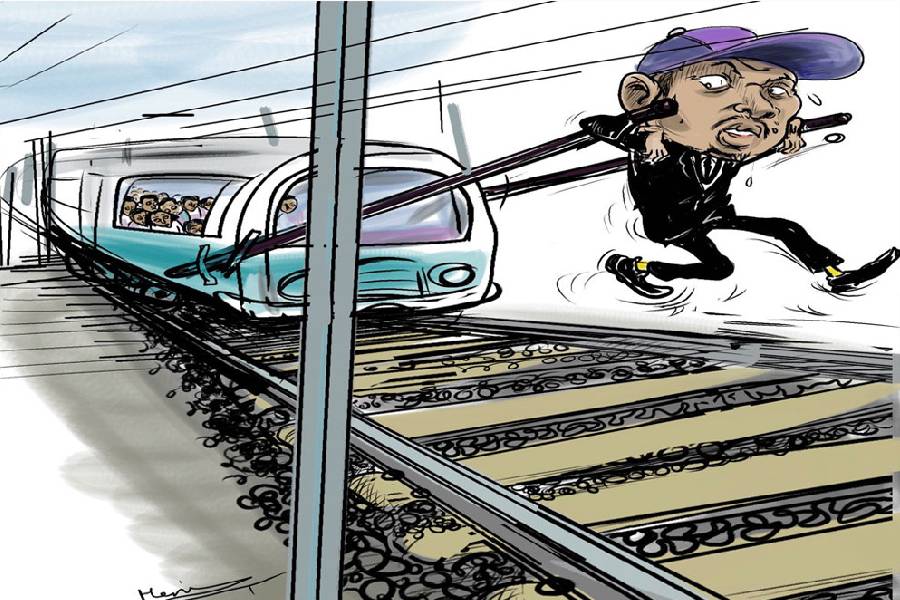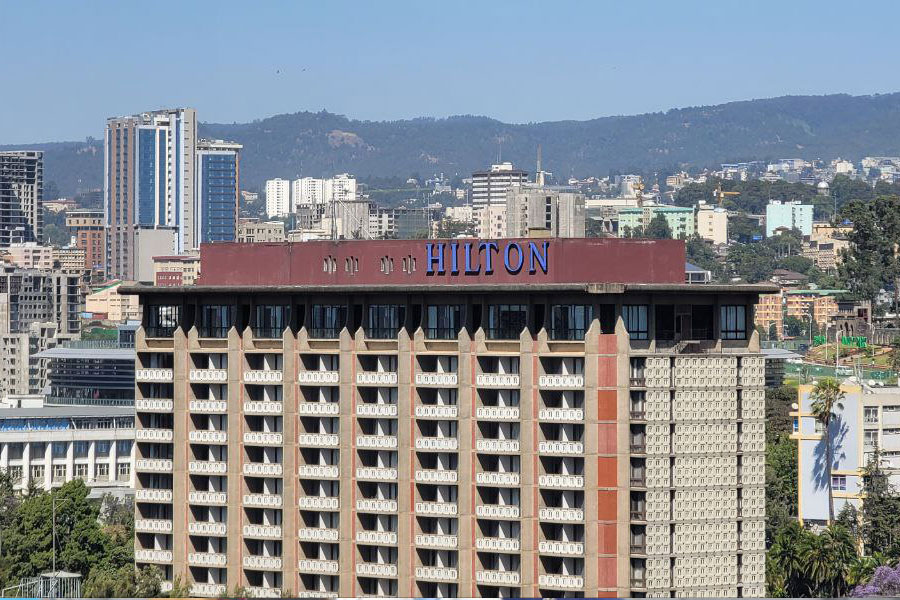
Radar | Jan 23,2021
The Addis Abeba Police Commission headquarters on Dejazmach Belay Zeleke St., appear rather serene from the outside. Located near Siemen Hotel, the facility comprises two marble white, interconnected buildings. It has a modern look with sharp edges and plenty of glass covering its facade. An uninformed passerby may even mistake it for a hotel.
Inside the buildings, however, is an atmosphere hard to mistake with the ambience of an upscale hotel. The place is busy, crowded with officers in uniform and detectives in civilian clothing. Countless offices, small and box-like, dot the well-lit hallways. Walking up and down the corridors last week was a tall man, Abayneh Sileshi.
He was visibly unsettled; his hands were shaking uncontrollably, and the furtive glances he kept shooting over his shoulder gave the impression of someone in a desperate situation. He was waiting to speak to a police officer willing to help him recover a vehicle that was stolen while in the hands of a driver he hired three months ago. It was an Isuzu FSR model truck - the kind of vehicle (usually white) that has gained an unenviable reputation for involvement in road accidents over the years.
The trucks have garnered a nickname - "Al-Qaeda" - for the sheer amount of damage and loss of life they inflicted on many.
Bad reputation notwithstanding, the loss of the truck came as a huge blow to Abayneh, who was desperate for answers last week. He had reported the theft, which occurred near the Gelan condominium site, to the Oromia Police Commission immediately after learning about it from his driver. Officers there told him he needed to get a supporting letter from their counterparts at the Addis Abeba Police Commission.
“The robbers assaulted the driver before escaping with the vehicle,” he told Fortune.
It was his second day at the headquarters, although not much had gone his way. Exasperated and spurred by desperation, he burst into one of the offices lining the hallways. His eyes were filled with tears. It did not do much good for him.
Abayneh's is a case that has become a grim routine for the capital's police officers. He is one of a sea of victims grappling with a rise in crime apparent in the city over the past couple of years. The growing malfeasance adds to worries and anxieties brought on by rampant inflation, towering unemployment, and poor public services.
A technician installs an alarm system in this Toyota model. The vehicle owner hopes the alarm will keep his car safe in a city that is seeing a spike in crime.
Like Abayneh, many victims of crime express their frustration at not finding the police helpful. Only a quarter of stolen vehicles are returned to their rightful owners.
Car robbers have grown more emboldened, with reports of grand theft auto taking place in broad daylight. It is among the most common crimes the 60 police stations in the city reported to the Organised Crime Investigation Division at the Police Commission.
Around two dozen cars are reported stolen every month. Addis Ketema, Bole, and Yeka of the 11 districts are the most exposed to vehicle theft. Over two-thirds of the 1.3 million vehicles registered in the country are in the capital.
In most cases, the thieves smuggle the stolen cars out of the capital, replacing plate numbers and forging ownership documents and title deeds. The destination for most stolen cars is neighbouring towns – such as Bishoftu, Lege Tafo, and Sululta – where the vehicles are quickly ripped apart. The parts are taken back to the market. Older cars, manufactured in the 1980s and 90s, are frequent targets as they lack electronic immobilisers that reduce the risk of vehicle theft.
Toyota Yaris models, such as the one Weldu Efrem used to drive, are among those the robbers prefer.
Weldu, 27, is another victim of grand theft auto. He had been working as a driver for taxi-hailing services, earning as much as 1,500 Br a day, before his car was stolen last year.
“I sustain injury from a bullet,” he told Fortune.
Although he reported the crime to the police, nothing has materialised thus far.
It was difficult for the police to apprehend the robbers due to weaknesses in vehicle registration systems that allow them to change the plate numbers and ownership documents, according to Yared Alemayehu, chief inspector and head of the criminal investigation unit at the Addis Abeba Police Commission.
Car thefts are rising against a backdrop where buying a car remains out of reach for most Ethiopians. For relatively newer models, such as the Toyota Vitz or Yaris, prices are hovering near the one million Birr mark. It is double what dealers asked two years ago.
Other forms of crime have also been on the rise in recent years. Perpetrators snatching items from unsuspecting victims' or vehicles is an everyday occurrence. Police reports confirm that organised crime is increasing in Addis Abeba, a city that enjoys a reputation as Africa's diplomatic and political capital. Foreign Office officials are keen on briefing newly arriving diplomats that Addis Abeba commands the fourth highest diplomatic representation in the world, following New York, Brussels and Geneva. They also like to remind their guests that Addis Abeba is one of the safest cities.
The numbers are betraying such claims. The city's police commission registered 10,000 more crimes last year than the 53,000 crimes reported five years ago. The figure represents a third of crimes reported in the country.
Theft and robberies account for more than half of crimes reported to the police, including burglary, fraud, and "breach of trust." Petty crimes like pickpocketing and intimidation also occur often, particularly in areas prone to congestion. The rising number of motorcycles has been a factor, allowing perpetrators to make a quick escape after snatching a smartphone, a bag, or jewellery. These crimes often occur in the evening, during rush hour, making it difficult for police officers to pursue the offenders. They are left to catch up with the new tactics criminals employ.
Alarmed by the growing crimes, municipal authorities banned the use of motorcycles in the city three years ago. However, they relaxed the rules eventually. The crimes continue.
Victims like Weldu can testify that offenders are not as hesitant as they once might have been to use violence. Police officers, too, do not deny the rise in crime.
"However, research is needed to conclude that the crime rate is increasing at an alarming rate," said Yonas.
ENACT is an initiative by the Institute for Security Studies and INTERPOL, monitoring crimes committed by transnational organised groups. Its last year's index put Ethiopia 34th of the 45 African countries and seventh of the nine in East Africa.
Experts like Endris Jafar, a PhD candidate who has taught social anthropology at Bahir Dar University, observed the growing crime rate is directly tied to high unemployment. Addis Abeba claims 21.2pc of its population is unemployed, much higher than the average urban unemployment rate of 16.8pc.
Coupled with population growth and increased poverty, unemployment significantly impacts growth and development at large.
“This brings with it a growing challenge for the urban economy,” said Endris. “It causes a waste of economic resources such as a productive labour force, and affects the economy's long-run growth potential.”
Other phenomena have also exacerbated the situation. A recently published UN economic report on Africa reveals the COVID-19 pandemic has pushed an estimated 55 million Africans into poverty, with Ethiopia and Nigeria the major sources of the "new poor" created over the past two years. While Ethiopia’s economy has registered double-digit growth over the past two decades, it is not producing enough jobs for its rapidly expanding population, particularly young people. Hence, nicknamed "the jobless growth."
High unemployment and underemployment are significant stresses in Addis Abeba and major contributors to high poverty levels. Youth aged 15 and 29 account for over a third of the capital's population. Experts warn that this large youthful population represents a double-edged sword for the city, offering the potential to spur growth but also posing a great challenge to job creation, which could have broader implications for social cohesion, crime, and violence.
“If left unaddressed, unemployment can increase crime and violence," warns Endris. "It threatens the social and political stability of the city.”
High crime rates are common in the cities of developing countries, which are known for their high rate of rural to urban migration, high youth unemployment rate, extreme poverty, high inequality, and poor social services. Global experiences indicate that rapid urbanisation and crime rates go hand in hand. This holds true for Addis Abeba, where the rate of urbanisation has shot up by nearly a fifth in recent years.
In the end, expert analysis and statistics will mean little for people like Abayneh and Wendu, who will both likely never see their vehicles again. The advice does, however, pertain to the police officers charged with protecting the public's well-being.
PUBLISHED ON
Jun 11,2022 [ VOL
23 , NO
1154]

Radar | Jan 23,2021

View From Arada | Oct 05,2024

Editorial | Aug 25,2024

Fortune News | Apr 03,2023

Fortune News | Mar 18,2023

Dec 22 , 2024 . By TIZITA SHEWAFERAW
Charged with transforming colossal state-owned enterprises into modern and competitiv...

Aug 18 , 2024 . By AKSAH ITALO
Although predictable Yonas Zerihun's job in the ride-hailing service is not immune to...

Jul 28 , 2024 . By TIZITA SHEWAFERAW
Unhabitual, perhaps too many, Samuel Gebreyohannes, 38, used to occasionally enjoy a couple of beers at breakfast. However, he recently swit...

Jul 13 , 2024 . By AKSAH ITALO
Investors who rely on tractors, trucks, and field vehicles for commuting, transporting commodities, and f...

Jul 5 , 2025
Six years ago, Ethiopia was the darling of international liberal commentators. A year...

Jun 28 , 2025
Meseret Damtie, the assertive auditor general, has never been shy about naming names...

Jun 21 , 2025
A well-worn adage says, “Budget is not destiny, but it is direction.” Examining t...

Jun 14 , 2025
Yet again, the Horn of Africa is bracing for trouble. A region already frayed by wars...